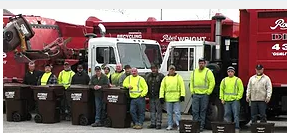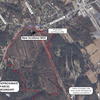New Scotland proposes $8M budget
— Photo from Wright Disposal website
Wright Disposal handles New Scotland residents’ garbage pickup and recycling. The town’s tentative budget has an extra $60,000 for recycling costs. In May, the cost of disposing of recyclables went from $10 per ton to $40 per ton; later in the summer, the cost spiked to $80 per ton.
NEW SCOTLAND — The town’s tentative budget for 2019 at $8,020,463 is up about $288,943 from this year.
Although it is a 3.6-percent increase from last year’s budget, the town, said Supervisor Douglas LaGrange, is below state-set levy limit by about $30,000. The limit, commonly referred to as a 2-percent tax cap, is actually set by a state formula and varies from municipality to municipality.
The budget has increased because of how the money is counted — revenue transferred between the funds looks like double-counting but is not — and because of an increase in recycling costs.
The fund balance, or rainy-day account, projected at $2.9 million for next year, is being drained of $49,000 for this year.
The current tax rate for all New Scotland residents (including those who live in the village of Voorheesville) is $1.40 per $1,000 of assessed value; the proposed 2019 rate is $1.43 per $1,000.
Budget workshops will be held on Oct. 15, 17, 22, and, 24 (if necessary), before the town board votes on adoption at its November meeting.
The town, LaGrange said, “is still trying to figure out recycling tipping fees.” There is $60,000 for it that was not in last year’s budget. New Scotland provides curbside collection service for its residents.
In May, the board had approved an addendum to the town’s contract with Wright Disposal for collection to pay Wright an additional $15,586 for the third year of a five-year contract, after the cost of disposing of recyclables went from $10 per ton to $40 per ton.
Disposal costs for recycling had spiked to $80 per ton this summer, and, in August, Jerry Wright, the president of Robert Wright Disposal, was before the town board, asking for an additional $40 per ton to offset costs. The board has yet to take any action.
It’s something that has to be discussed at the next town board meeting, on Oct. 10, LaGrange said, most likely in executive session. The town, according to LaGrange, may have to re-bid the service, and has to decide whether to stick the added cost in residents’ taxes, or tack on a fee for collection. A determination will have to be made before the board votes on the budget.
Increased costs for snow removal and for servicing debt are a couple of things that pushed the proposed budget over $8 million.
New Scotland’s snow removal budget is up about $41,ooo over last year, from about $366,000 to $407,000. Historically, LaGrange said, the town has consistently under-budgeted for snow removal; the $41,ooo increase is a correction.
Servicing the debt for plow trucks purchased by the town increased about $31,000. Typically, the town pays for two trucks at a time, LaGrange said; for 2018, the town “needed a little catching up because [the town] got behind in past years” and has to pay the bond on three trucks in 2019.
The largest expected generators of revenue are $2.1 million from sales tax; $230,000 from mortgage tax; and $226,000 in state aid for the highway department. The remainder — $2.8 million — is levied in property taxes.
Proposed salaries for the town’s full-time elected officials are about $61,000 for the supervisor; $57,000 for the town clerk; and $72,700 for the highway superintendent. In part-time posts, the two judges each earn $27,600 and the four town board members each earn $9,000.


